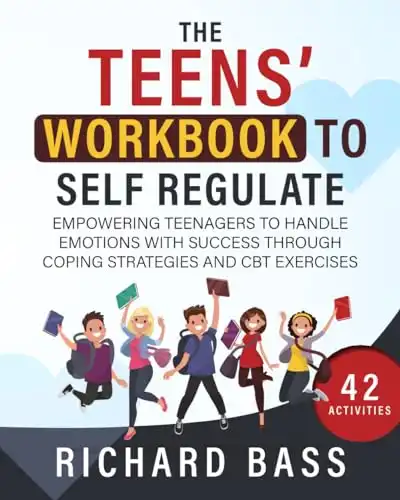We’ve all been there – the eye rolls, the sighs, and the seemingly endless battle of wills. Welcome to the world of parenting teenagers, where dealing with their attitudes can sometimes feel like a never-ending rollercoaster ride.
But fear not, because in this ultimate guide, we’re going to tackle the art of defusing teen attitudes with grace, patience, and a sprinkle of humor.
So, fasten your seatbelts, and let’s embark on this journey of understanding and connecting with our teens like never before.

This post contains affiliate links. I will earn a commission at no additional charge to you if you make a purchase using my links. Click here to see my full disclosure policy.
Understanding the Teenage Brain

Before we jump into the tactics and strategies for diffusing teen attitudes, it’s essential to understand the teenage brain.
Adolescence is a time of immense change and growth, both physically and mentally. The brain undergoes significant rewiring during this period, leading to a few characteristics that may explain those puzzling attitudes:
Emotion Overdrive
The emotional centers of the brain (the amygdala) are on hyperdrive during adolescence. This means that teens often feel emotions intensely, which can lead to dramatic reactions.
Risk-Taking
The prefrontal cortex, responsible for impulse control and decision-making, is still under construction. Teens are more prone to taking risks and being impulsive, sometimes leading to questionable decisions.
Desire for Independence
Adolescents are on a quest for independence, which can sometimes manifest as defiance. They’re trying to find their own identity, separate from their parents.
Peer Influence
Peer relationships become incredibly important. Teens are heavily influenced by their friends, and they may distance themselves from family as they seek approval from their peers.
Understanding these brain changes helps us approach the teenage attitude problem with empathy. After all, they’re navigating a tumultuous period of self-discovery.
Teenage Breakups: A Parents Guide to Supporting Your Teen Through Heartbreak
Open Communication: The Foundation of Diffusing Attitudes

Listen Actively
The first rule of effective communication is to listen actively. When your teen shares something, put away distractions, maintain eye contact, and show that you genuinely care about what they’re saying. This simple act can defuse many attitude problems right from the start.
Avoid Judgement
Teens often hold back their thoughts or emotions out of fear of judgment. Create a safe space where they can express themselves without fear of being criticized.
Use ‘I’ Statements
When discussing issues, use ‘I’ statements to express how their behavior or words affect you. For example, say, “I feel hurt when you raise your voice,” instead of “You always yell at me.” This approach is less confrontational and encourages a more empathetic response.
Respect Privacy
While maintaining open communication, also respect their privacy. Everyone, even teens, deserves personal space. Make sure they know you trust them and respect their boundaries.
Understanding the Triggers

Teen attitudes don’t just materialize out of thin air; they often have triggers. Identifying these triggers can help parents navigate potential attitude storms more effectively.
Stress and Overload
School, extracurricular activities, and social pressures can pile up on a teenager. When they’re feeling stressed and overloaded, they may be more prone to displaying attitudes.
Lack of Sleep
Many teenagers suffer from sleep deprivation due to their changing circadian rhythms and busy schedules. Lack of sleep can lead to irritability and attitude problems.
Hormonal Changes
The hormonal rollercoaster of adolescence can make emotions run high. Be aware of the fact that some attitude problems might be hormonally driven.
Peer Pressure
Teens may act differently around friends. Peer pressure can push them to display attitudes that are out of character when they’re at home.
This article I wrote about triggers for tween attitudes certainly applies to teens (and adults):
5 Shockingly Simple Ways On How To Improve Tween Attitude Right Now
Dealing with Attitudes: Strategies and Techniques

Stay Calm
When faced with an attitude, it’s crucial for parents to stay calm. Reacting with anger or frustration can escalate the situation. Take a deep breath and remember that you’re the role model for emotional regulation.
Pick Your Battles
Not every attitude problem is worth addressing. Decide which issues are the most important to address, and let some minor ones slide.
Use Humor
Sometimes, humor can be a fantastic way to defuse a situation. Making a joke or finding a lighthearted angle can break the tension and bring a smile to your teen’s face.
Offer Choices
Teens often feel a lack of control in their lives. Offering them choices, even on small matters, can help them feel more empowered and less likely to display attitudes.
Set Clear Boundaries
While granting autonomy is important, setting clear boundaries is equally crucial. Teens need to know the limits and consequences of their actions.
Building Empathy

Empathy is the key to understanding and connecting with your teen. When you show them that you understand their feelings and perspective, it can lead to more cooperative behavior.
Empathetic Listening
When your teen is upset, practice empathetic listening. Try to understand their point of view and reflect it back to them. This shows that you’re taking their feelings seriously.
Share Your Own Experiences
Share your own teenage experiences and the lessons you’ve learned. This can help them see that you’ve been through similar challenges.
Encourage Empathy
Encourage your teen to consider the feelings of others. Ask questions like, “How do you think that made your friend feel?” to help them develop empathy.
Finding Common Ground

Creating shared experiences and interests can help bridge the generation gap and reduce attitudes.
Family Activities
Plan regular family activities that everyone can enjoy. It could be a movie night, a board game, or a hiking trip. These moments can be a welcome break from the tensions of adolescence.
Discover Their Interests
Take an interest in your teen’s hobbies and passions. It’s an excellent way to connect and bond.
Quality Time
Spend quality time together. Whether it’s a heart-to-heart conversation or simply watching a show together, these moments can be precious for both you and your teen.
Seeking Professional Help

In some cases, attitudes might be a sign of deeper emotional or behavioral issues. If attitudes persist or become increasingly severe, it’s essential to seek professional help. Therapists and counselors can provide guidance and support to both parents and teenagers.
Final Thoughts on Teen Attitude
Dealing with teenage attitudes is a challenging but manageable aspect of parenting. Remember, those attitudes are often a reflection of the internal struggles and external pressures that teenagers face.
By maintaining open communication, understanding the triggers, and using empathy and patience, you can navigate the stormy seas of adolescence and build a stronger, more connected relationship with your teen.
So, the next time you encounter a dramatic eye roll or a heavy sigh, remember that it’s just another opportunity to connect and guide your teenager toward adulthood. You’ve got this!







